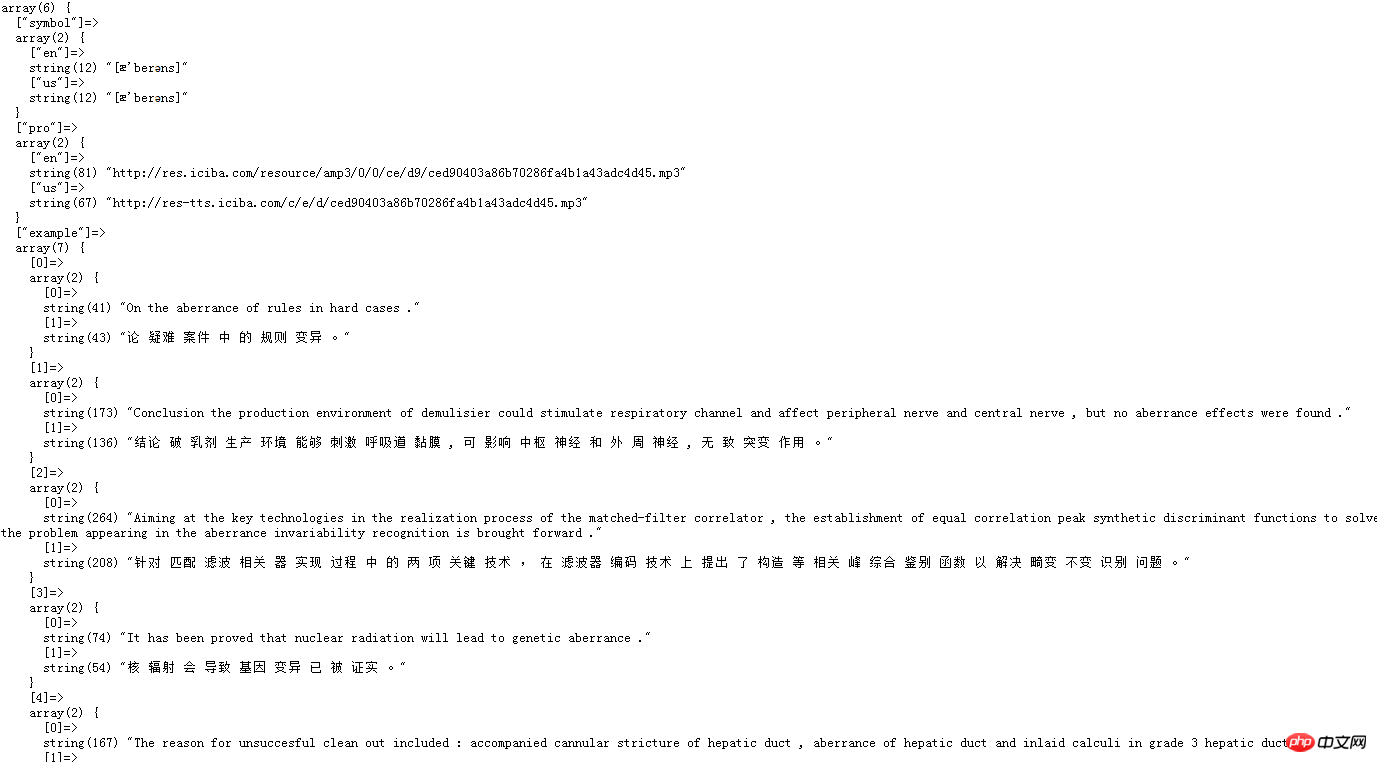ホームページ >バックエンド開発 >PHPチュートリアル >PHPクエリ辞書作成例の共有
PHPクエリ辞書作成例の共有
- *文オリジナル
- 2017-12-25 14:00:072035ブラウズ
この記事は主に PHP で百度辞書単語検索コレクターを作成することに関する関連情報を紹介します。皆様のお役に立てれば幸いです。

Baidu dict コレクション サンプル
Baidu dict 辞書から翻訳後のすべての結果データを収集するために書かれています。もちろん、13.5w の単語ライブラリと単純なコレクション ケースが付属しています。ここではメイン クラス dict.class を書きます。 .php プロジェクトのアドレス http://github.com/widuu/baidu_dict でリリースしてください。必要な場合は、フォークするだけです~まあ、これを使用する人はほとんどいないので、便利な兄弟がそれを取り上げました~
<?php
/**
* dict.class.php 采集百度词典翻译内容
*
* @copyright (C) 2014 widuu
* @license http://www.widuu.com
* @lastmodify 2014-2-15
*/
header("content-type:text/html;charset=utf8");
class Dict{
private $word;
//显示的条数
private static $num = 10;
public function __construct(){}
/**
* 公用返回百度采集数据的方法
* @param string 英文单词
* retun array(
* symbol" => 音标
* "pro" => 发音
* "example"=> 例句
* "explain"=> 简明释义
* "synonym"=> 同反义词
* "phrase" => 短语数组
* )
*
*/
public function content($word){
$this -> word = $word;
$symbol = $this -> Pronounced();
$pro = $this->getSay();
$example = $this -> getExample();
$explain = $this -> getExplain();
$synonym = $this -> getSynonym();
$phrase = $this -> getPhrase();
$result = array(
"symbol" => $symbol, //音标
"pro" => $pro, //发音
"example"=> $example, //例句
"explain"=> $explain, //简明释义
"synonym"=> $synonym, //同反义词
"phrase" => $phrase //短语数组
);
return $result;
}
/**
* 远程获取百度翻译内容
* get function curl
* retun string
*
*/
private function getContent(){
$useragent = "Mozilla/5.0 (Windows NT 6.1; WOW64; rv:23.0) Gecko/20100101 Firefox/23.0";
$ch = curl_init();
$url = "http://dict.baidu.com/s?wd=".$this->word;
curl_setopt($ch, CURLOPT_URL, $url);
curl_setopt($ch, CURLOPT_USERAGENT,$useragent);
curl_setopt($ch, CURLOPT_RETURNTRANSFER, TRUE);
curl_setopt($ch, CURLOPT_FOLLOWLOCATION, 1);
curl_setopt($ch, CURLOPT_HTTPGET, 1);
curl_setopt($ch, CURLOPT_AUTOREFERER,1);
curl_setopt($ch, CURLOPT_HEADER, 0);
curl_setopt($ch, CURLOPT_TIMEOUT, 30);
$result = curl_exec($ch);
if (curl_errno($curl)) {
echo 'Errno'.curl_error($curl);
}
curl_close($ch);
return $result;
}
/**
* 获取百度翻译发音
* retun array(英,美)
*
*/
private function Pronounced(){
$data = $this -> getContent();
preg_match_all("/\"EN\-US\"\>(.*)\<\/b\>/Ui",$data,$pronounced);
return array(
'en' => $pronounced[1][0],
'us' => $pronounced[1][1]
);
}
/**
* 获取百度翻译发音
* return array(英,美)
*
*/
private function getSay(){
$data = $this -> getContent();
preg_match_all("/url=\"(.*)\"/Ui",$data,$pronounced);
return array(
'en' => $pronounced[1][0],
'us' => $pronounced[1][1]
);
}
/**
* 获取百度翻译例句
* return array() 多维数组 例句
*
*/
private function getExample(){
$str = "";
$data = $this -> getContent();
preg_match_all("/var example_data = (.*)\]\;/Us",$data,$example);
$data1 = "[[[".ltrim($example[1][0],"[");
$data2 = explode("[[[",$data1);
$num = count(array_filter($data2));
foreach($data2 as $key => $value){
$data3 = explode("[[","[[".$value);
foreach ($data3 as $k => $v) {
preg_match_all("/\[\"(.*)\",/Us","[".$v, $match);
if(!empty($match[1])){
$str .= implode($match[1]," ")."@";
}
}
}
$data4 = trim($str,"@");
$data5 = explode("@", $data4);
$result = array_chunk($data5, 2);
return $result;
}
/**
* 获取简明释义
* return array (x => "词性",b => "附属")
*
**/
private function getExplain(){
$data = $this -> getContent();
preg_match_all("/id\=\"en\-simple\-means\"\>(.*)\<p(\s+)class\=\"source\"\>/Us",$data,$explain);
$r_data = $explain[1][0];
preg_match_all("/\<p\>\<strong\>(?P<adj>.*)\<\/strong\>\<span\>(?P<name>.*)\<\/span\>\<\/p\>/Us", $r_data, $a_data);
preg_match_all("/\<span\>(?P<tag>[^\>]+)\:\<a(\s+)href\=\"(.*)\"\>(?P<word>.*)\<\/a\>\<\/span\>/Us", $r_data, $b_data);
$result = array();
foreach ($a_data["adj"] as $key => $value) {
$result[$value] = $a_data["name"][$key];
}
$word_b = array();
foreach ($b_data["tag"] as $key => $value) {
$word_b[$value] = strip_tags($b_data["word"][$key]);
}
$result_data = array("x" => $result,"b" => $word_b);
return $result_data;
}
/**
* 获取同义词
* return array(0 => "同义词", 1 => "反义词") 一般为多维数组
*
*/
private function getSynonym(){
$data = $this -> getContent();
preg_match_all("/id=\"en\-syn\-ant\"\>(.*)<p(\s+)class\=\"source\">/Us",$data,$synonym);
$content = $synonym[1][0];
$data1 = explode("</dl>", $content);
$result = array();
$data2 = array();
foreach ($data1 as $key => $value) {
preg_match_all("/\<strong\>(?P<adj>.*)\ \;\<\/strong\>\<\/p\>\<p(\s+)class\=\"syn\-ant\-list\"\>\<ul\>(?<content>.*)\<\/ul\>/Us", $value, $r_data);
$data2[$key]["adj"] = $r_data["adj"];
$data2[$key]["content"] = $r_data["content"];
}
foreach ($data2 as $key => $value) {
foreach ($value["content"] as $k => $v) {
if(!empty($v)){
preg_match_all("/\<li\>\<p\>(?P<title>.*)\<\/p\>(?P<value>.*)\<\/li>/Us", $v, $v_data);
foreach ($v_data['title'] as $m => $d) {
$data = strip_tags(preg_replace("<</a>>"," ", $v_data["value"][$m]));
$result[$key][$value["adj"][$k]][$d] = $data;
}
}
}
}
return $result;
}
/**
* 获取短语词组
* return array (key => value) 一维或者多维数组
*
*/
private function getPhrase(){
$num = self::$num;
$data = $this -> getContent();
preg_match_all("/id=\"en\-phrase\"\>(.*)\<p class\=\"source\"\>/Us",$data,$phrase);
$data = explode("</dd>",$phrase[1][0]);
$data1 = array_slice($data,0,$num);
$result = array();
foreach ($data1 as $key => $value) {
$data2 = explode("</p>", $value);
$n = count($data2);
if($n<=3){
$result[str_replace(" ","",strip_tags($data2[0]))] = strip_tags($data2[1]);
}else{
$data3 = array_slice($data2,0,$n-1);
$data4 = array_slice($data2,0,2);
$res = array_diff($data3,$data4);
$data5 = array_chunk($res,2);
$key_value = trim(str_replace(" ","",strip_tags($data4[0])));
$result[$key_value] = strip_tags($data4[1]);
foreach ($data5 as $key => $value) {
foreach ($value as $k => $v) {
$value[$k] = strip_tags($v);
}
$array = array($result[$key_value],$value);
if (array_key_exists($key_value, $result)){
$result[$key_value] = $array;
}
}
}
}
return $result;
}
/**
* 将数组转换为字符串
*
* @param array $data 数组
* @param bool $isformdata 如果为0,则不使用new_stripslashes处理,可选参数,默认为1
* @return string 返回字符串,如果,data为空,则返回空
*/
private function array2string($data, $isformdata = 1) {
if($data == '') return '';
if($isformdata) $data = $this->new_stripslashes($data);
return addslashes(var_export($data, TRUE));
}
/**
* 返回经stripslashes处理过的字符串或数组
* @param $string 需要处理的字符串或数组
* @return mixed
*/
private function new_stripslashes($string) {
if(!is_array($string)) return stripslashes($string);
foreach($string as $key => $val) $string[$key] = $this->new_stripslashes($val);
return $string;
}
}
// $word = new dict("express");
// $word ->content();関連おすすめ:
以上がPHPクエリ辞書作成例の共有の詳細内容です。詳細については、PHP 中国語 Web サイトの他の関連記事を参照してください。
声明:
この記事の内容はネチズンが自主的に寄稿したものであり、著作権は原著者に帰属します。このサイトは、それに相当する法的責任を負いません。盗作または侵害の疑いのあるコンテンツを見つけた場合は、admin@php.cn までご連絡ください。

